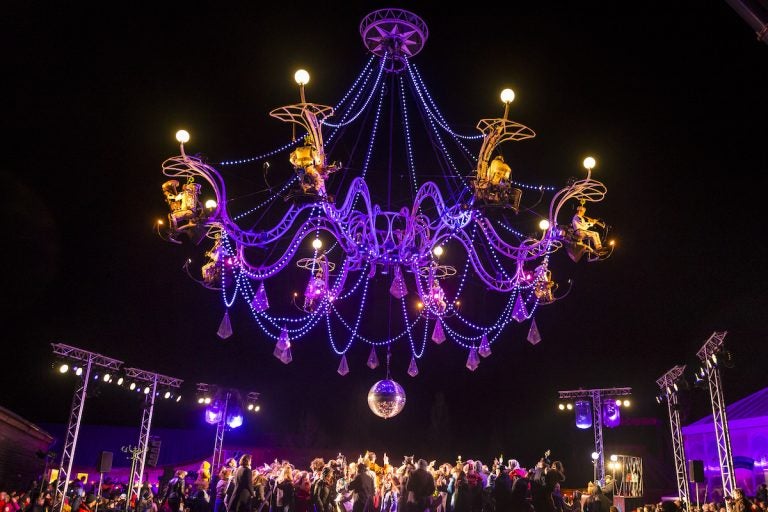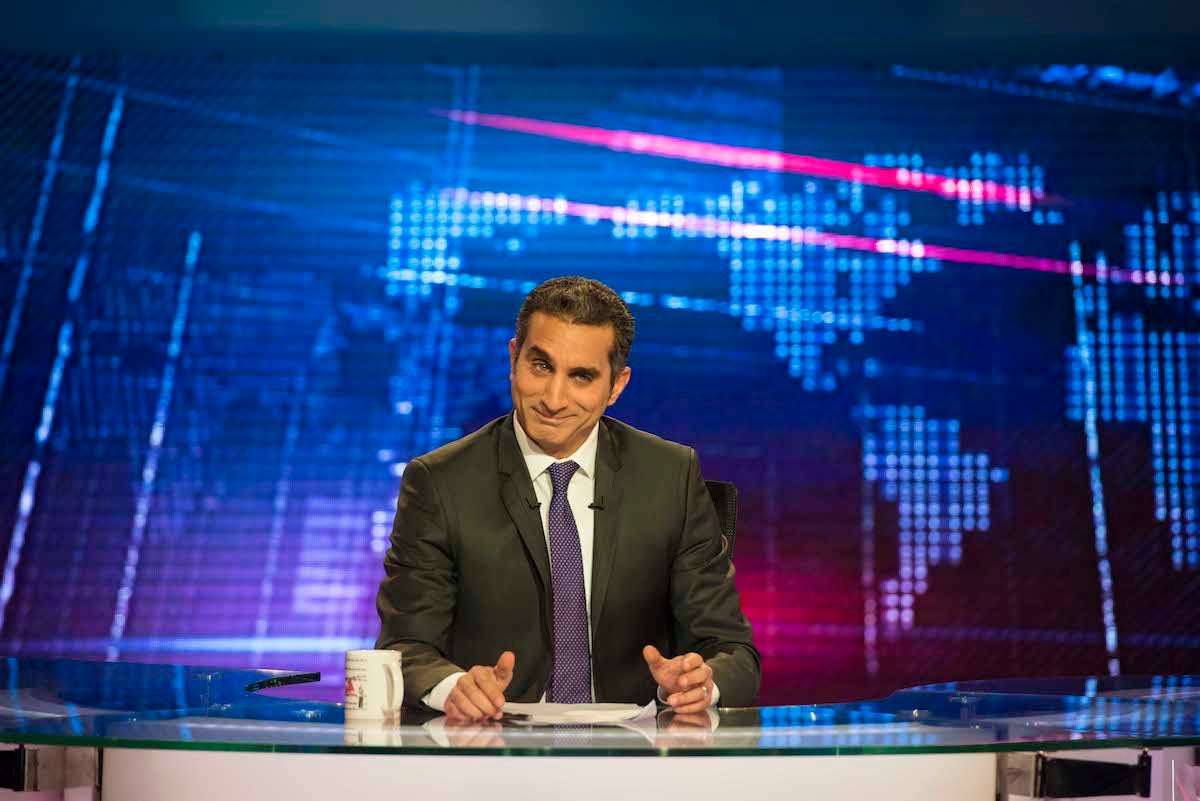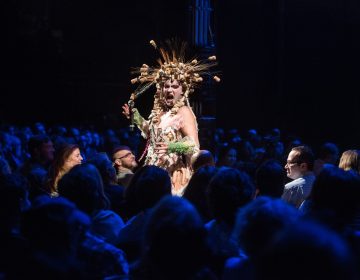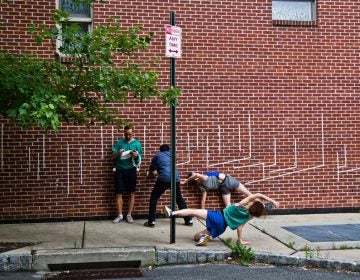Circus arts, satire, and a flying chandelier at International Festival of the Arts, June 1 – 10, 2018
With an eclectic mix of groundbreaking performances, the Philadelphia International Festival of the Arts offers something for everyone.

Yes, that's a dance party below a giant chandelier. (Image courtesy of Juan Robert)
Over the next 11 days, if you were so inclined, you could witness an adaptation of “Hamlet” featuring competitive sheep herding; a brass band playing in a giant chandelier suspended in air; and a 24-hour performance of American musical history in drag.
It’s all a part of PIFA, the Philadelphia International Festival of the Arts, which is organized by the Kimmel Center. This year’s lineup includes the return of a favorite from the 2011 event, two MacArthur geniuses, world and Philadelphia premieres, and several shows that break out of the theater to explore the city. There’s a block party on Broad Street on June 9, and shows of all kinds kick off Friday. Here’s the full lineup, and below, some of the more intriguing performances on offer this year.
Cristal Palace by Compagnie Transe Express
- June 1 – June 10, 8pm
- Banks of the Schuylkill River, near the intersection of Fountain Green and Kelly drives
- Tickets: $25
Nearly every night of PIFA, French performance troupe Compagnie Transe Express will be whipping up a dance party on the banks of the Schuylkill. A massive, glittering chandelier will float above the crowd carrying eight musicians, playing along with the rest of their earthbound band. The chandelier twirls and swoops over dancers’ heads; aerialists and acrobats tumble from silks and swing from trapezes attached to its arms. Transe Express performed high above a crowd of nearly 200,000 people on Broad Street during PIFA in 2011, and this show promises to be just as exciting. Plus, it’s kid-friendly.
As a bonus, Zimbabwean a capella quintet Nobuntu will perform live 20 minutes before the start of each show, so be sure to arrive early. Also consider riding your bike: Cristal Palace takes place along the Schuylkill River Trail, and parking may be frustrating.
Taylor Mac’s 24-Decade History of Popular Music
- Part I: June 2, noon – midnight; Part II: June 9, noon – midnight
- Merriam Theater, 250 S. Broad St., Philadelphia 19102
- Tickets: $69 – $300 per show
In this epic musical marathon, MacArthur Genius Taylor Mac reels through 246 songs over the course of 24 hours, retelling 240 years of American history from the perspective of its disenfranchised, downtrodden, and discarded. Think of it as “A People’s History of the United States” meets “Hairspray.” Mac performs popular music of the times in opulent and inventive drag — supported by more than 100 musicians, acrobats, and burlesque performers — to knit together a new understanding of the American pageant. (For a behind-the-scenes perspective, check out this Artblog interview with Mac’s costumer, who describes using discarded Mylar flags to design this character costume: “Betsy Ross had an illegitimate child who moved to New Orleans and opened a laundromat called the Washerie.”)
In this Philly premiere, the show will take place in two 12-hour segments: On Saturday, spanning the years from 1776 to 1896, and on June 9, spanning from 1896 to today. It’s the longest performance of the work since Mac powered through all 24 hours at once in Brooklyn last year. Viewers are encouraged to attend both shows, but they can also be enjoyed individually. Here’s a FAQ of everything else you could want to know about attending a 12-hour show.

Bassem Youssef: The Joke is Mightier Than the Sword
- June 6, 7:30 p.m.
- Verizon Hall at the Kimmel Center, 300 S Broad St, Philadelphia, PA 19102
- Tickets: $45 – $59
Last spring, Egyptian comedian Bassem Youssef told Trevor Noah of “The Daily Show” that he may be the unluckiest person in the world after recently moving to California. “I left a strongman dictatorship back in Egypt, just in time to find you starting yours,” he said — only half jokingly.
The doctor-turned-satirist has been billed as the Arab world’s Jon Stewart, and, indeed, his comedy is bitingly political. The stakes of his dissent, however, have always been higher. In his book, “Revolution for Dummies: Laughing Through the Arab Spring,” Youssef recounts how he rose to prominence during the fall of Egyptian President Hosni Mubarak and how quickly he became a pariah in the new, more conservative regime that followed. Youssef’s show, “Al-Bernameg,” was the Middle East’s first political satire show, and the most watched program in the region from 2011 to 2014. But after he was arrested, interrogated, and pressured by the government, Youssef ended the show and left the country.
His stage show reflects on that turbulent time in Egyptian history and his personal life, drawing parallels with American politics. He points out how the mass media and propaganda play a role propping up the strongman regimes he now knows so well.
The Fever by 600 Highwaymen
- June 6 – June 10 at 7 p.m; June 8 and June 9 at 10 p.m.; June 10 at 2 and 6 p.m.
- SEI Innovation Studio at the Kimmel Center, 300 S. Broad St., Philadelphia 19102
- Tickets: $35
I called Abigail Browde and Michael Silverstone, the artists behind the New York-based theater company 600 Highwaymen, and asked them to tell me more about audience participation in their show “The Fever,” which will have its Philadelphia debut during PIFA. But they demurred.
“The truth is that the best audiences are the ones that don’t know that it’s interactive,” said Silverstone. “Because interactive theater and participatory theater have this crazy long history of being, usually, pretty bad.”
Sorry to ruin the surprise, but spoiler: Despite being participatory, “The Fever” promises to be very good. Audiences in other cities have called it “profound” and “a revelation”; the New York Times called it “a poetic evocation of our mostly unspoken — and uncalled-upon — dependence on one another.” The performance is made anew every night with an audience of 70 people. “The show kind of takes on whoever is in the room,” said Silverstone. Whatever their initial hesitations, “a lot of the people, after the do the show, they say, ‘I want to come back,’ because they can’t really believe it’s going to happen again.”
This article is part of a new effort recommending things to do in the Philly region. Tell us what you think
WHYY is your source for fact-based, in-depth journalism and information. As a nonprofit organization, we rely on financial support from readers like you. Please give today.





